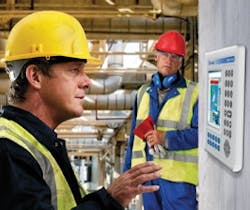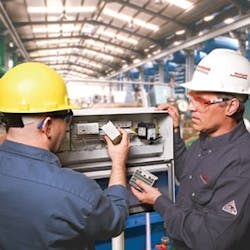Contenders or Pretenders?
By Dan Hebert
In today’s flat world, process industry firms have access to the same equipment and the same automation hardware and software, similar external engineering and system integration resources, and capital at comparable costs.
Given all these similarities, what separates the winners from the losers? Management—more specifically process engineering and automation management. But because management is a two-way street, and because even the best managers can be thwarted by incompetent or uncooperative subordinates, there’s a second key determinant of success.
That would be those subordinates and their relationships with their managers. It’s easy to blame management for all problems, but, in reality, all employees have a part to play.
What determines good management and good manager/subordinate relationships? Textbook definitions are useful, but often trite. The real answers come from people just like you, the managers and subordinates working in process industry firms.
What Makes a Good Manager?
The essential traits for a good process automation manager come by the dozens, but number one on most lists is technical acumen. “Managers must truly understand what automation employees do from a technical standpoint,” observes Dale Evely PE, principal engineer I&C at Southern Co. in Birmingham, Ala. “Not understanding causes employee dissatisfaction because commitments are made to customers that can’t be met properly.”
Managers must be strong technically to see the big picture. “Managers must understand the entire system and how it affects different parts of the plant as well as the business,” comments Gary Crenshaw, corporate engineer at Beam Global Spirits and Wine in Clermont, Ky. “They must keep up to date with current technology and have plans for obsolescence,” he continues.
Richard McCormick, automation engineer with Mick Automation in Levis, Quebec, an industry consultant with extensive plant operations experience, sees things the same way. “A strong technical background is mandatory, and this background should cover the site’s automation system specifics as much as possible. One simply can’t manage highly technical resources efficiently without knowing and understanding what they’re doing on a daily basis,” emphasizes McCormick.
Managers must observe and monitor the progress of their employees, but they need to let them accomplish tasks independently.
Courtesy of Rockwell Automation.
“As a manager, you must understand the technical capabilities of other employees. Understanding their technical weaknesses and strengths enables an automation manger to select the best person for the intended work package,” observes Pillay.
Chaos reigns when managers don’t understand the technology. “Managers must understand, document, and enforce the operational philosophy of the plant,” emphasizes Jeff Waufle, IT technical services supervisor for the Las Vegas Valley Water District. “Well-meaning staff will constantly try to bend the philosophy by introducing improvements. Strong technical management of change policy will help keep automated processes true to the original intent.”
Talk To Me
In addition to technical acumen, process automation managers need great communication skills, and employ them at multiple levels. First, managers must communicate effectively and often with their subordinates. Second, they must be able to convince their superiors in senior management that automation can deliver tangible business benefits. Third, they must negotiate with other peer-level managers on items such as resource needs.
“Managers must be able to articulate process control needs and value to customers, and they must motivate engineers to focus on end results instead of what seems cool,” observes Dan Cox, director of manufacturing systems at AOC Resins in Collierville, Tenn., summing up the importance of communication skills up and down the managerial chain.
“Managers must be able to relate an automation process in laymen’s terms to the customer and/or the end user,” says Pete Atkinson, an MIS engineer with Boehringer Ingelheim Vetmedica in St. Joseph, Mo. Speaking to less technically astute folks is something automation managers need to do every day, and this requires important communication skills such as empathy, patience and understanding.
The traditional boss/subordinate role is between an engineering manager and a technical professional, but perhaps a more important indirect supervisory relationship exists between technical professionals and plant operators. The best process automation system in the world can be rendered ineffective pretty quickly if plant operators aren’t on board.
McCormick of Mick Automation has extensive experience working with plant operations staff to implement plant additions and improvements. “You must develop a friendly relationship with operators, and get them on your side. This will dramatically improve success rates when implementing control system modifications, especially for more challenging applications like advanced control,” he observes.
Teach Me
Engineers are all about efficiency, and the most efficient short-term method for accomplishing a task is usually to do it oneself. But a manager’s job is instead to teach others, delegate tasks, and make sure tasks are correctly completed.
Because process automation is not often taught in the education system, teaching is a critical component of a manager’s skill set. A manager who can hire employees with the right aptitude, and then teach them what they need to know will have a keen awareness of each employee’s strengths and weaknesses. Knowing this allows managers to assign the right task to each worker more effectively.
Much of the teaching and learning that occurs among managers and subordinates happens on the plant floor, not in the classroom or the office.
Courtesy of Rockwell Automation.
Hiring employees with the right aptitude, teaching them what they need to know, assigning each employee appropriate tasks and monitoring each employee’s work is quite a challenge. Many managers are tempted to avoid this challenge and not delegate, but this puts severe limits on an organization’s ability grow.
“Too many managers try to do too much themselves, don’t challenge their employees enough, and don’t verbally reward their employees,” notes Rick Dolezal, market development manager of the process business for Rockwell Automation.
“The true goal of a good manager is to achieve more success from an employee than they could generate by themselves. To do this, managers need to inspire confidence and allow employees room to accomplish tasks in their own way, yet be there to provide support when employees need direction,” he continues. Dolezal stresses it’s especially important to give employees this freedom to accomplish tasks as they see fit, provided they follow broad guidelines. Giving employees autonomy and allowing them to be creative increases productivity, satisfaction and work quality.
The Manager as Leader
Some think the term “manager” is an anachronism when dealing with 21st-century relationships among highly trained technical professionals. Harry Gianakis, staff engineer with DuPont in Philadelphia, explains why bosses must lead instead of manage.
“Leadership traits are most important among process automation leaders (not managers) and professionals. Technical acumen is important as well, but the focus going forward needs to be on developing leaders in our profession. Focusing on political skills has to become secondary.
“Important traits and characteristics process automation leaders should embody are setting a vision, continually keeping that vision out in front of their professionals, and helping them attain that vision by exemplifying a strong work ethic and breaking down all barriers that come their way.
“Leaders must make their human resources feel extremely valued and important. Everything should be all about their professionals, not about them. Leaders must ensure that most of the recognition and credit goes to their professionals and other staff. To paraphrase Colin Powell, leadership is lonely.
“One area where the leader/professional relationship falls short is communication. Discussions need to be held more often than during annual performance appraisals. The most valuable message a leaders can send to his or her professionals is that the most important thing is not how much you know, but to have you know how much I care.
“Process industry companies must transform and grow their bosses into leaders. These leaders will then be able to effectively deal with and manage any difficult situation or relationship that comes their way.”
How to Improve Manager/Employee Relationships
We now know what it takes to be a good process automation manager, but it is not at all obvious how to get there. Here are a few tips from the front lines.
“Most process automation managers were promoted based on their strong technical skills, but fall short in people managing skills,” notes Lee Swindler, control systems manager for LyondellBasell Industries in Channelview, Texas. “They’re very capable of learning how to manage, but most companies do a poor job of equipping new managers with the training and tools needed to make the transition quickly and effectively,” adds Swindler.
Just as teaching is an important skill for managers, so is learning, and learning can only occur when firms provide the right managerial training. Management skills can be greatly improved with a reasonable amount of training, unlike technical skills, which must be learned the hard way through many years of on-the-job training.
Heinz North America in Warrendale, Pa., provides specific managerial training, outlined here by Douglas Rheinheimer, an electrical and automation manager for the company. “Process automation managers must create specific, measurable, attainable, relevant and time-sensitive (SMART) goals that are co-developed with the manager and the subordinate. Pulsing these SMART goals periodically through coaching and positive feedback will create a sense of ownership and empower the subordinate. The boss must also create a framework that will allow the subordinate to envision a picture of the tasks at hand.”
The best process automation managers come into their positions with strong technical capabilities. They have the aptitude to learn management, but often must be trained. The best managers are not dictators, but are instead leaders who coach their employees to success and revel in the accomplishments of their flock.
Dan Hebert PE is Control’s senior technical editor
Eleven Commandments of ManagementSome of the best input for this article was necessarily anonymous, particularly the eleven commandments of management delivered from on high by a U.S.-based process automation engineer with over 25 years’ experience as a boss and as a subordinate.
|
Six Commandments for SubordinatesThere are eleven long commandments for process automation managers, but only six short ones for their subordinates. These are courtesy of Darren Pillay, an MES consultant with Sasol Technology. Johannesburg, South Africa.
|
Integrators Do It DifferentlyMost of this article looks at management from a process end-user point of view, but the engineering firms and system integrators that serve process end users have a slightly different take. Their management roles can be even more challenging than end users’, as many must deal with relatively large groups of employees and simultaneously serve two masters: their own company and their clients. “Managers must be able to bid accurately, properly set up a project, identify changes of scope, make proper delegation based on resource capability, perform proper mentoring and have good hiring intuition,” says Bob Zeigenfuse, the CEO/president of Advanced Automation. “Too many managers don’t mentor and then delegate. They feel that by the time they do this properly, they could have done the work themselves. They also hire for technical skills to hit the ground running, when they should be hiring for aptitude and attitude,” adds Zeigenfuse. “Bosses need to have training in personality traits, delegation and mentoring. They must communicate strategic, operational, performance and career goals quarterly to all subordinates; and they must have a reward system for performance based on these goals,” concludes Zeigenfuse. A second system integrator lists desired subordinate behaviors. “Subordinates must be adaptable so that they can switch between different kinds of projects,” comments Jim Ford, the director of advanced automation solutions at Maverick Technologies. “Attention to detail is critical because it can mean the difference between a high-quality deliverable and a failed project due to a serious technical error,” continues Ford. “Subordinates must maintain skills and should seek out additional training and courses on their own. Good employees work well with others, but are also willing to work independently. Finally, subordinates should not be afraid to admit they don’t know how to do something—and they should learn from their mistakes,” sums up Ford. David Bishop, the president of Matrix Technologies believes, “Managers and those who work for them must respect each other’s thoughts and opinions. “Respect and trust allow a healthy exchange of ideas and thoughts to ensure the best solution can be applied in any situation. Reviews are an essential part of relationship improvement. If the employee knows that the manager is interested enough to help the employee improve, the relationship is greatly enhanced. These reviews can be the formal or informal, but they must take place on a regular basis.” |




